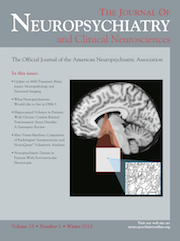To the Editor: Schizophrenia is a chronic neuropsychiatric disorder characterized by diversity of symptoms grouped into positive, negative, and cognitive spheres.
1 Like the symptoms, the etiology of schizophrenia is also diverse. Among the various etiological hypotheses, immune system aberrations have been consistently implicated.
2 C-reactive protein (CRP), a marker of inflammation, has been found to be high in schizophrenia patients, and its levels linked with the severity of negative symptoms and cognitive deficits in schizophrenia.
3,4 Interestingly, minocycline, an antibiotic with immunomodulatory properties,
5 has been reported to be useful as an adjunctive agent in acute and early phases of schizophrenia.
6,7 To the best of our knowledge for the first time, herein, we describe two case reports in which minocycline was found to be useful as an add-on agent in treating persistent negative symptoms in schizophrenia with concurrent reduction in levels of CRP.
Case Reports
#1. “Mr. V,” a 25-year-old man with a diagnosis of undifferentiated schizophrenia (ICD-10), presented with complaints of occupational dysfunction, along with features suggestive of persistent negative symptoms, namely, amotivation, alogia, anhedonia, apathy, affective blunting, and attention deficits, despite being treated with a combination of clozapine (300 mg/day) and amisulpride (100 mg/day) over the past 6 months. His psychopathology scores as assessed by Scale for Assessment of Positive Symptoms (SAPS) and Scale for Assessment of Negative Symptoms (SANS) were 13 and 89, respectively. Hematological assessments, fasting blood sugar, lipid profile, liver, and renal function tests were normal. Serum C-reactive protein (CRP) level was found to be elevated (2.51 ng/mL). Minocycline (100 mg/day) was added to his ongoing treatment. After 3 months, the patient showed significant improvement in negative symptoms (SANS score: 62); he was also occupationally functional, with his functional status described by the mother as the best achieved by him over the past 8 years of illness. His repeat CRP level was found to be reduced (1.76 ng/mL). The patient maintained this improvement over a further follow-up period of 6 months.
#2. “Ms. B,” a 23-year-old woman with a diagnosis of paranoid schizophrenia (ICD-10), presented with complaints of attention and concentration deficits, discontinuation of her singing, and asociality for 1 year, with positive symptoms in remission while on risperidone (4 mg/day). Because of distressing weight gain, hirsutism, and hyperprolactinemia, risperidone was substituted with aripiprazole without worsening of positive symptoms. Her psychopathology assessment by Scale for Assessment of Positive Symptoms (SAPS) and Scale for Assessment of Negative Symptoms (SANS) revealed scores of 10 and 26, respectively. Hematological assessments, fasting blood sugar, lipid profile, liver, and renal function tests were normal. Serum C-reactive protein (CRP) level was found to be elevated (3.7 ng/mL). Minocycline (100 mg/day) was added to her ongoing treatment. After 2 months, she showed significant improvement in negative symptoms (SANS score: 21); she also started singing and music, with improved attention, concentration, and social interaction, as reported by her parents. Her repeat CRP level was found to be reduced (2.7 ng/mL). The patient maintained this improvement over a further follow-up period of 2 months.
Discussion
These two case reports suggest the effective role of add-on minocycline in treating negative symptoms in schizophrenia patients with elevated serum CRP levels. Minocycline, besides being an antibiotic, also has the property of agonistic action on NMDA receptors.
7 NMDA receptor hypofunctioning, leading to reduced glutaminergic transmission, has been shown to have a possible role in the negative symptoms and cognitive deficits in patients with schizophrenia.
8 Interestingly, minocycline also possesses anti-inflammatory action,
5 which possibly explains the decrease in CRP levels, and hence, symptom improvement. Thus, we conclude that minocycline can be used as an add-on therapy in schizophrenia with resistant negative symptoms and in patients with raised serum CRP levels.

